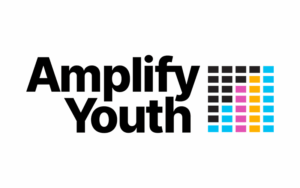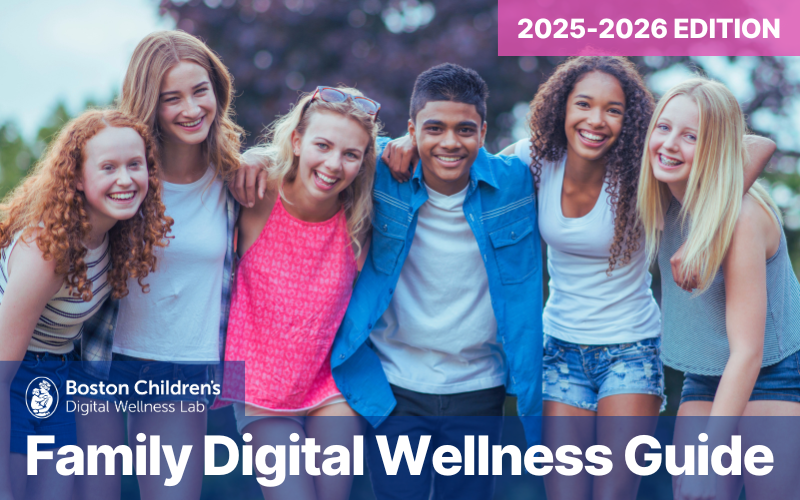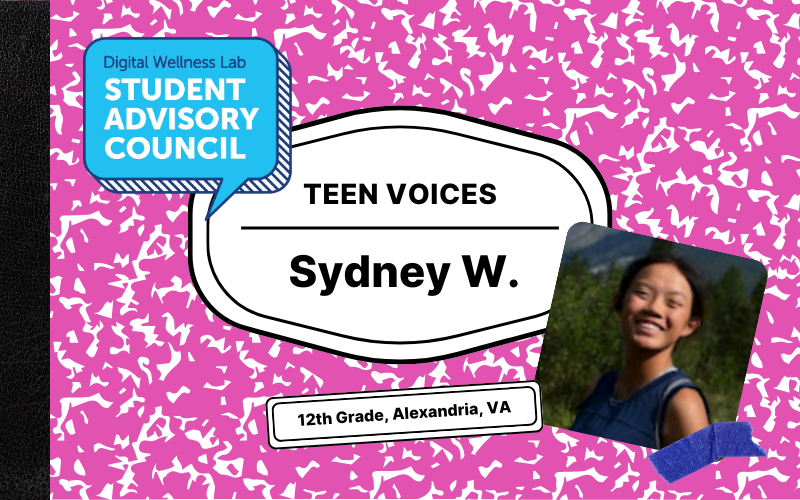Sydney W. was a member of the Digital Wellness Lab’s 2022-23 Student Advisory Council. They share their thoughts on what parents, tech and media companies, and policymakers need to know about how teens use the internet.
What does a “day in the life” look like for you with using technology and digital media?
On an average day, I’ll wake up and immediately check my phone for any message notifications from my public Discord servers (and respond accordingly). As the day goes on, I continue to check my phone for those same notifications, text my mom, and in small moments of free time, I’ll read books or other fiction on my phone, as well as absorb my daily news through osmosis on Tumblr. This continues throughout the school day, looking up things, taking pictures, or notes on my phone as needed, and then when it hits exactly 9 pm at night, I’ll read the most recent Webtoons update. I use my phone mostly for entertainment and note-taking purposes, and it works out pretty well for me. On the other hand, my computer is all business — if I have it out, I’m working on homework, college applications, my writing, etc. On days I don’t have homework or something “serious” to work on, I’ll rarely pull it out, since most everything I’d do on my computer I can do on my phone just as easily.
Unlike how some adults like to remind us to come back to the real world, technology and the internet IS our real life.
What are your favorite platforms/apps and why?
I’m a big fan of the Internet Archive to read books on, as well as Tumblr. The Internet Archive is an extensive place to read books, and is often a lot more accessible to me than a Kindle app or something like that. There’s SO much stuff on there. On Tumblr, I get my news through some very funny ways, but I’m still learning news and that’s great. Over the years, I’ve gotten my Tumblr to work for me, so that I see the fandoms, art, and writing that I enjoy — it’s a great place to discover new things without having to expose my identity, or having to come across some incredibly rancid takes.
What are the greatest opportunities you see for teens when it comes to using technology?
The ability to see and express different perspectives and absorb different information without a filter is definitely one of the greatest opportunities available to teens. While most teens (me included) use our phones and technology for entertainment and education, we also have the chance to learn things without a single filter — the internet gives us easy access to banned books, for example, or explores situations either from both sides, or without a political or financially charged reason for why things are explained in certain ways. And on a lighter level, it lets us learn about things that can really add to your overall quality of life, like learning a new hobby, learning new coping skills, or even just a way to save money.
What are the greatest challenges you see for teens when it comes to using technology?
Anything that exists on technology is real life. Unlike how some adults like to remind us to come back to the real world, technology and the internet IS our real life. And all the negativity we see on the internet, whether it’s about war, civil rights, injustice, or downright hate is something really affects us mentally — the same way as cyberbullying, positive feedback, and other things mean the same thing to us when we see it online, as if we had seen them in-person, or experienced them directly from another physical human being. There’s a lot of potential for harm and hopelessness on the Internet, and it’s often amplified by the algorithms on many sites.
What are the greatest opportunities you have and challenges you personally face when it comes to managing your technology use?
The greatest opportunities I personally have are pretty much relegated to communicating with my friends, and learning new things. I’ve been able to keep in contact with friends I made at various places that I had assumed I’d never meet again — but here I am, still playing Minecraft with them, or talking about our days, not to mention the quality and ease of communication between my friends at school over times like winter break. I’ve picked up so many new hobbies, including OCTs (writing/art tournaments), book-binding, and so much more on my time on the Internet, allowing me to really feel accomplished and well-rounded and giving me a whole new slew of communities to make friends and learn from. Challenge-wise, I often feel isolated or exhausted by the sheer amount of information and “idealistic” lifestyles I come across. The ability of anyone to just reach out to me can be scary, and while convenient, I struggle a lot with FOMO (fear of missing out), which can make diving into those new communities and actually making friends really difficult, especially since I don’t often have a lot of energy to devote to these kinds of things.
Challenge-wise, I often feel isolated or exhausted by the sheer amount of information and “idealistic” lifestyles I come across.
What would you want to see changed or redesigned for technology and/or media to be healthier for teens?
We need more privacy laws in place, specifically to limit the power of the tech and media companies. Today, the majority of our private data is online. Without firm, clear federal regulation in the United States, there’s a serious risk to human rights and general wellbeing of people on the internet — think about the mental impact of doxxing or the systemic bias of demographic based watch lists, like the reveal of the no-fly list populated by infants based on their family’s race or religion. Data is “protected” in the United States under three laws, none of which directly relate to data privacy. These include the GLBA (protecting consumers from financial institutions), COPPA (protecting children under 13), and the HIPAA (protecting medical information). However, none of these offer the comprehensive protection that laws like “The General Data Protection Regulation” (GDPR) offer. (The GDPR was established by the EU in 2018, establishing specific data-use and collection regulation — enforced by fines maxing out at 20 million euros — and is the most powerful data protection law to date.) I believe that a federal regulation similar to the GDPR in the US that explicitly addresses data privacy would be difficult, but necessary to pass. Obviously, these regulations would face pushback from companies that are known to collect data, like Facebook or Threads. But with GDPR in place and California’s successful passing of the California Consumer Privacy Act that protects data on a similar level, a similarly robust federal regulation seems possible for our future.
Without firm, clear federal regulation in the United States, there’s a serious risk to human rights and general wellbeing of people on the internet.
What, if anything, do you think parents and caregivers are missing when it comes to understanding how teens use media?
The Internet IS real life, but curated. There’s so many ways you can make your digital life better (like settings for dark mode, bigger text, filters, etc.) that teens use almost unconsciously that expedites the experience, making less “wasted” time on phones and technology. Also, I feel as though parents and caregivers miss that the Internet is the average teenager’s “third” space AKA not school or home, their place to kind of just hang out with their friends. At least where I live, getting to my friends isn’t convenient, and just “hanging out” can be a half-hour ordeal when I really just want to meet up casually and spontaneously. In comparison, hopping on to Discord to have a conversation where both of us are either getting things done (doing homework, filling out forms, etc.) or having fun on our own terms (me playing Tetrissweeper, and them playing Destiny 2) while holding a conversation, so we can have that short conversation without the hassle. I’ve been told to get out more to hang out, but before I could drive it just wasn’t super convenient and even now while I can, it’s still easier to use Discord or just to text them.
What guidance or advice do you have for parents and other caregivers to help teens to build and maintain healthy behaviors around digital media and technology?
To remind their teens that they can always take a step back from the Internet if they need to. It’s important to remember that people on the Internet can often feel like the most important thing in the world, but they don’t know you, and you don’t know them.
Sydney W. was a member of the 2022-23 Digital Wellness Lab’s Student Advisory Council and is currently a high school senior in Alexandria, VA.
Here at the Lab, we welcome different viewpoints and perspectives. However, the opinions and ideas expressed here do not necessarily represent the views, research, or recommendations of the Digital Wellness Lab, Boston Children’s Hospital, or affiliates.








